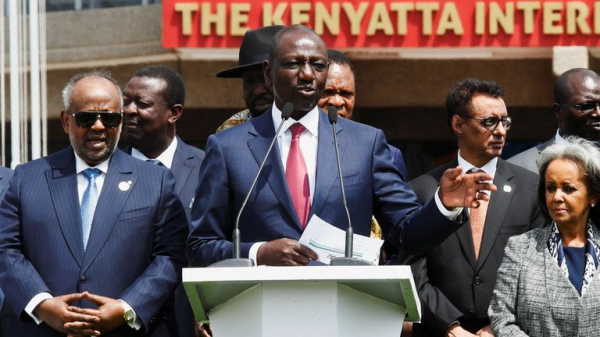Tax polluting fossil fuels and flying to fund climate action in Africa, leaders say

Leaders of African nations needing to pay for expensive climate measures have called for a new global tax on polluting industries like fossil fuels, shipping and aviation to help raise funds.
The proposal is the culmination of the first ever African Climate Summit, held in Kenya and involving leaders from the continent of 1.3 billion people – a population set to double by 2050.
The money would be used to provide “dedicated, affordable and accessible finance for climate positive investments at scale” and insulate them from changing domestic interests, the Nairobi Declaration said.
Leaders also called for a reform of the global financial system that currently makes it far more expensive for countries in Africa to borrow money than it does for countries in Europe, like the UK.
That can make it much harder to fund projects like wind or solar farms that the continent needs to build a cleaner energy future.
In an attempt to shed an image of the continent as bearing the brunt of floods, drought and other climate change impacts, the Nairobi gathering highlighted how African nations can tackle the climate crisis – especially by boosting renewable energy.
“No country should ever have to choose between development aspirations and climate action,” the Nairobi Declaration said.
The leaders called on other nations to get behind their plans, which will form a key part of their negotiating position in the upcoming global climate talks, COP28 in Dubai in December.

At the negotiations, countries agree the global next steps to tackle climate change, with single states or alliances offering different actions, such as funding projects or ditching coal, in return for others doing the same.
Last year’s talks, COP27 in Egypt, resulted in what was seen as a “monumental win” for developing nations when an idea once seen as very unlikely finally gained widespread support.
After years of campaigning by developing nations, at COP27 leaders agreed to set up a fund to pay for losses and damages from climate change that would be paid into by richer, more polluting countries.
However, the size of the fund and who should pay in is still a long way from being decided.
A lack of funding is repeatedly identified as a major barrier slowing down the transition to a cleaner future in vulnerable nations, including many in Africa.
Investment is needed not just for replacing fossil fuel with clean power, but for other things needed for green technology like mining and refining minerals.
Poorer countries tend to have contributed the least to climate change, and research last year by thinktank IIED found they are more likely to suffer harsh impacts from it.
Spreaker This content is provided by Spreaker, which may be using cookies and other technologies. To show you this content, we need your permission to use cookies. You can use the buttons below to amend your preferences to enable Spreaker cookies or to allow those cookies just once. You can change your settings at any time via the Privacy Options. Unfortunately we have been unable to verify if you have consented to Spreaker cookies. To view this content you can use the button below to allow Spreaker cookies for this session only. Enable Cookies Allow Cookies Once
Click to subscribe to ClimateCast with Tom Heap wherever you get your podcasts
Africa accounts for around 4% of global greenhouse gases, compared with 13% in the European Union, which has less than half the population.
The Nairobi Declaration capped the three-day Africa Climate Summit in Kenya, which was dominated by discussions of how to mobilise financing to adapt to increasingly extreme weather, conserve natural resources and develop renewable energy.
The final document was heavy on demands that major polluters commit more resources to help poorer nations and make it easier for them to borrow at affordable rates.
It urged world leaders “to rally behind the proposal for a global carbon taxation regime including a carbon tax on fossil
fuel trade, maritime transport and aviation, that may also be augmented by a global financial transaction tax”.
Watch The Climate Show with Tom Heap on Saturday and Sunday at 3pm and 7.30pm on Sky News, on the Sky News website and app, and on YouTube and X, formerly known as Twitter.
The show investigates how global warming is changing our landscape and highlights solutions to the crisis.
